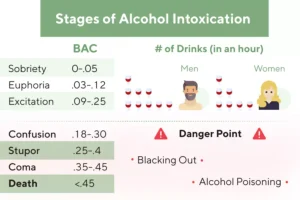
Sometimes, a doctor may advise a person to only avoid certain types of food or drink. Additionally, drinking alcohol before surgery could delay gastric emptying, which is the speed at which food exits the stomach and enters the small intestine. Bleeding during surgery can increase the length of time a person needs to stay in the hospital and increase the risk of complications and death. This article looks at why people need to avoid alcohol before surgery, what happens if they consume alcohol before surgery, and how long before surgery a person needs to stop consuming alcohol. Some individuals may experience allergic reactions to blood thinners, leading to symptoms such as hives, itching, and difficulty breathing.
Side Effects
Pain is a response from the involuntary nervous system used to protect the body from harm. No matter what type of pain occurs, the nervous system uses the same mechanisms to relieve it. “I never would recommend to someone, ‘Go ahead and drink wine, even if you don’t like it, because you’re going to be less likely to have a heart attack,’” Li said. Meanwhile, a study published last month showed that deaths related to excessive drinking are rising in the United States, especially among women. Any educational information on this page does not replace an in-person consultation with your local cardiologist or electrophysiologist. This information is to be used at your own risk based on your own judgment.

Individual Differences in Response to Alcohol

It’s essential to approach alcohol consumption responsibly and be mindful of its potential impact on our overall health and well-being. It’s essential to differentiate between the effects of alcohol on blood flow and the actual thickness of the blood. The temporary increase in blood flow caused by alcohol may have various short-term effects, but it does not change the inherent viscosity of the blood. It’s relatively safe to consume alcohol as long as you’re in good overall health and have confirmed with a healthcare professional. According to the Dietary Guidelines for Americans, published by the U.S. Department of Agriculture, moderate drinking is up to one drink per day for women and up to two drinks per day for men.
How does alcohol consumption affect my high cholesterol or risk of other cardiovascular issues?
Factor Xa inhibitors have an anticoagulation effect by blocking factor Xa, which therefore helps decrease blood clot production. In this article, we’ll explore the relationship between alcohol and blood thinning. Before undergoing general anesthetic, a person may have to avoid eating any foods for at least 6 hours and drinking any beverages for at least 2 hours before surgery.
Relationship Between Alcohol and Heart Health
- The acute effects of alcohol on the myocardium include a weakening of the heart’s ability to contract (negative inotropic effect).
- It recommends not stopping Eliquis before completing therapy, and avoiding anti-inflammatory drugs, other blood thinners, and platelet inhibitors to decrease risk.
- This includes other anticoagulants—such as warfarin, Pradaxa (dabigatran), Brilinta, (ticagrelor), or heparin, or nonsteroidal anti-inflammatory drugs (NSAIDs).
- It has been assumed that some of the processes involved in making raw milk cheeses would likely kill the virus.
- They can help develop personalized treatment plans, which may include detoxification, therapy, counseling, and support to overcome alcohol addiction.
- Researchers have found a relationship between sensitivity to acute pain and resting blood pressure.
- This can cause the medication to stay active for longer and have a greater effect than it should.
The findings suggest a protective effect of overexpression of IGF-1 in the transgenic animals (Zhang et al. 2014). Data from transgenic animal models and pharmacologic approaches strongly support a role for ethanol-induced oxidative stress in CV disease. In addition, there was no evidence of nitrative damage in mice bred to disrupt (i.e., knock out) the gene for angiotensin I receptor (AT1-KO) that had been given ethanol for a similar length of time (Tan et al. 2012). In various biologic systems, oxidative stress can be measured or inferred by several biologic indexes. Understanding the facts about alcohol and its effects on blood is crucial for making informed decisions regarding your health and well-being. Misconceptions can lead to misunderstandings and potentially harmful behaviors.
- The liver produces this protein, which plays an important role in controlling blood flow and promoting blood clotting.
- A 2016 review suggests that significant daily alcohol consumption increases the activity of platelets.
- In this section, we’ll talk about the specific dangers that come with alcohol being a blood thinner, as well as some of the more general risks of alcohol use.
- A person who is uncertain whether they can drink alcohol while taking blood thinners should speak with a doctor.
- If you have been prescribed a blood thinner, it’s important to pay attention to signs of bleeding, like red or black colored stool, severe headache, light-headedness, and fainting.
As noted in the text, the exact amount and duration of alcohol consumption that results in ACM in human beings varies. The exact sequence of the development of ACM remains incompletely alcohol as a blood thinner understood. Data from animal models and human beings with a history of long-term drinking suggest that oxidative stress may be an early and initiating mechanism.

Seeking Professional Help
While the mechanism behind why this happens is unclear, the theory is that this moderate consumption reduces stress reactivity in the brain. Drinking alcohol in moderation may have a protective effect on your blood vessels. Some research finds that alcohol increases levels of high-density lipoproteins (HDL, aka “good cholesterol”). This healthy type of cholesterol helps protect your arteries and prevent the blood clots that can lead to heart attacks and strokes.

